Report on Nursing: Care Principles, Equality Legislation, and Capacity
VerifiedAdded on 2023/06/04
|6
|1494
|341
Report
AI Summary
This report delves into critical nursing concerns, emphasizing the general principles of care, the UK's Equality Act 2010, and the Mental Capacity Act 2005. It highlights the importance of patient and family involvement in care, grounded in patient-centered approaches and human rights principles. The report discusses a general care plan involving a dementia-stricken patient, focusing on holistic health and psychosocial support. It outlines the key provisions of the Equality Act 2010, which protects against discrimination in healthcare and the workplace, and explains how the Mental Capacity Act 2005 safeguards vulnerable individuals unable to make decisions about their health, wellbeing, and financial interests. The report underscores the legal and ethical responsibilities of healthcare practitioners in upholding patient dignity, independence, and rights.

Running Head: NURSING CONCERNS 1
Nursing Concerns
Name
Institution
Date
Nursing Concerns
Name
Institution
Date
Paraphrase This Document
Need a fresh take? Get an instant paraphrase of this document with our AI Paraphraser
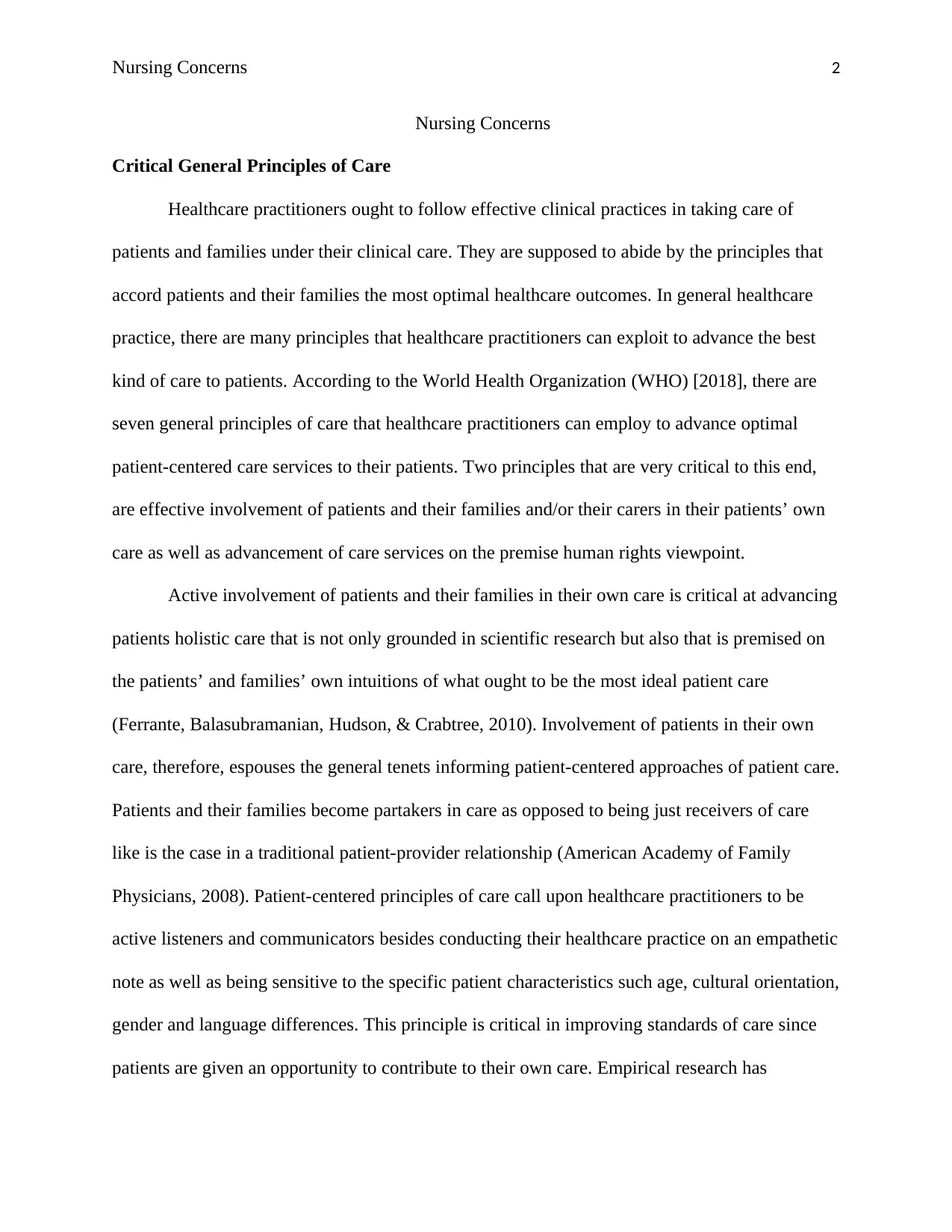
Nursing Concerns 2
Nursing Concerns
Critical General Principles of Care
Healthcare practitioners ought to follow effective clinical practices in taking care of
patients and families under their clinical care. They are supposed to abide by the principles that
accord patients and their families the most optimal healthcare outcomes. In general healthcare
practice, there are many principles that healthcare practitioners can exploit to advance the best
kind of care to patients. According to the World Health Organization (WHO) [2018], there are
seven general principles of care that healthcare practitioners can employ to advance optimal
patient-centered care services to their patients. Two principles that are very critical to this end,
are effective involvement of patients and their families and/or their carers in their patients’ own
care as well as advancement of care services on the premise human rights viewpoint.
Active involvement of patients and their families in their own care is critical at advancing
patients holistic care that is not only grounded in scientific research but also that is premised on
the patients’ and families’ own intuitions of what ought to be the most ideal patient care
(Ferrante, Balasubramanian, Hudson, & Crabtree, 2010). Involvement of patients in their own
care, therefore, espouses the general tenets informing patient-centered approaches of patient care.
Patients and their families become partakers in care as opposed to being just receivers of care
like is the case in a traditional patient-provider relationship (American Academy of Family
Physicians, 2008). Patient-centered principles of care call upon healthcare practitioners to be
active listeners and communicators besides conducting their healthcare practice on an empathetic
note as well as being sensitive to the specific patient characteristics such age, cultural orientation,
gender and language differences. This principle is critical in improving standards of care since
patients are given an opportunity to contribute to their own care. Empirical research has
Nursing Concerns
Critical General Principles of Care
Healthcare practitioners ought to follow effective clinical practices in taking care of
patients and families under their clinical care. They are supposed to abide by the principles that
accord patients and their families the most optimal healthcare outcomes. In general healthcare
practice, there are many principles that healthcare practitioners can exploit to advance the best
kind of care to patients. According to the World Health Organization (WHO) [2018], there are
seven general principles of care that healthcare practitioners can employ to advance optimal
patient-centered care services to their patients. Two principles that are very critical to this end,
are effective involvement of patients and their families and/or their carers in their patients’ own
care as well as advancement of care services on the premise human rights viewpoint.
Active involvement of patients and their families in their own care is critical at advancing
patients holistic care that is not only grounded in scientific research but also that is premised on
the patients’ and families’ own intuitions of what ought to be the most ideal patient care
(Ferrante, Balasubramanian, Hudson, & Crabtree, 2010). Involvement of patients in their own
care, therefore, espouses the general tenets informing patient-centered approaches of patient care.
Patients and their families become partakers in care as opposed to being just receivers of care
like is the case in a traditional patient-provider relationship (American Academy of Family
Physicians, 2008). Patient-centered principles of care call upon healthcare practitioners to be
active listeners and communicators besides conducting their healthcare practice on an empathetic
note as well as being sensitive to the specific patient characteristics such age, cultural orientation,
gender and language differences. This principle is critical in improving standards of care since
patients are given an opportunity to contribute to their own care. Empirical research has
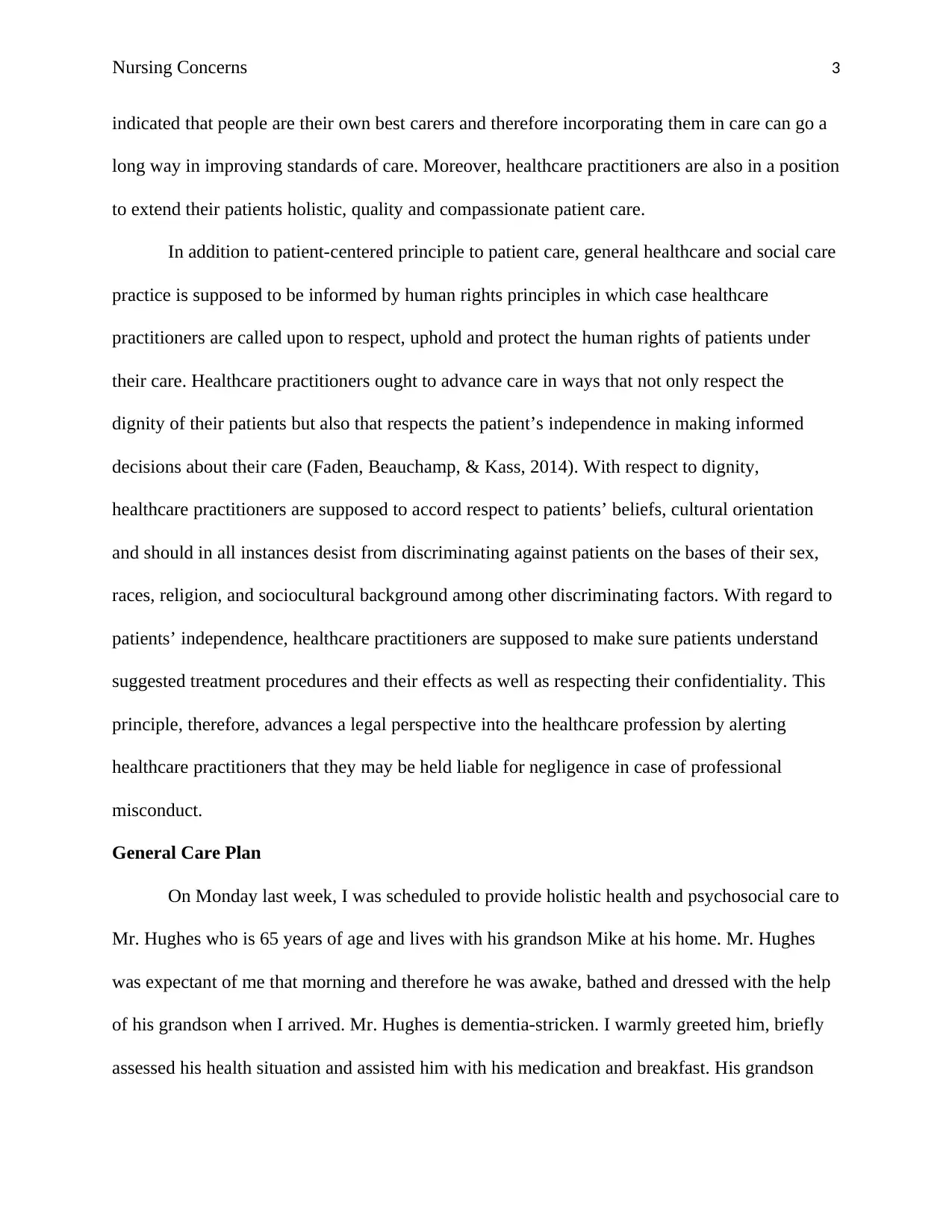
Nursing Concerns 3
indicated that people are their own best carers and therefore incorporating them in care can go a
long way in improving standards of care. Moreover, healthcare practitioners are also in a position
to extend their patients holistic, quality and compassionate patient care.
In addition to patient-centered principle to patient care, general healthcare and social care
practice is supposed to be informed by human rights principles in which case healthcare
practitioners are called upon to respect, uphold and protect the human rights of patients under
their care. Healthcare practitioners ought to advance care in ways that not only respect the
dignity of their patients but also that respects the patient’s independence in making informed
decisions about their care (Faden, Beauchamp, & Kass, 2014). With respect to dignity,
healthcare practitioners are supposed to accord respect to patients’ beliefs, cultural orientation
and should in all instances desist from discriminating against patients on the bases of their sex,
races, religion, and sociocultural background among other discriminating factors. With regard to
patients’ independence, healthcare practitioners are supposed to make sure patients understand
suggested treatment procedures and their effects as well as respecting their confidentiality. This
principle, therefore, advances a legal perspective into the healthcare profession by alerting
healthcare practitioners that they may be held liable for negligence in case of professional
misconduct.
General Care Plan
On Monday last week, I was scheduled to provide holistic health and psychosocial care to
Mr. Hughes who is 65 years of age and lives with his grandson Mike at his home. Mr. Hughes
was expectant of me that morning and therefore he was awake, bathed and dressed with the help
of his grandson when I arrived. Mr. Hughes is dementia-stricken. I warmly greeted him, briefly
assessed his health situation and assisted him with his medication and breakfast. His grandson
indicated that people are their own best carers and therefore incorporating them in care can go a
long way in improving standards of care. Moreover, healthcare practitioners are also in a position
to extend their patients holistic, quality and compassionate patient care.
In addition to patient-centered principle to patient care, general healthcare and social care
practice is supposed to be informed by human rights principles in which case healthcare
practitioners are called upon to respect, uphold and protect the human rights of patients under
their care. Healthcare practitioners ought to advance care in ways that not only respect the
dignity of their patients but also that respects the patient’s independence in making informed
decisions about their care (Faden, Beauchamp, & Kass, 2014). With respect to dignity,
healthcare practitioners are supposed to accord respect to patients’ beliefs, cultural orientation
and should in all instances desist from discriminating against patients on the bases of their sex,
races, religion, and sociocultural background among other discriminating factors. With regard to
patients’ independence, healthcare practitioners are supposed to make sure patients understand
suggested treatment procedures and their effects as well as respecting their confidentiality. This
principle, therefore, advances a legal perspective into the healthcare profession by alerting
healthcare practitioners that they may be held liable for negligence in case of professional
misconduct.
General Care Plan
On Monday last week, I was scheduled to provide holistic health and psychosocial care to
Mr. Hughes who is 65 years of age and lives with his grandson Mike at his home. Mr. Hughes
was expectant of me that morning and therefore he was awake, bathed and dressed with the help
of his grandson when I arrived. Mr. Hughes is dementia-stricken. I warmly greeted him, briefly
assessed his health situation and assisted him with his medication and breakfast. His grandson
⊘ This is a preview!⊘
Do you want full access?
Subscribe today to unlock all pages.

Trusted by 1+ million students worldwide
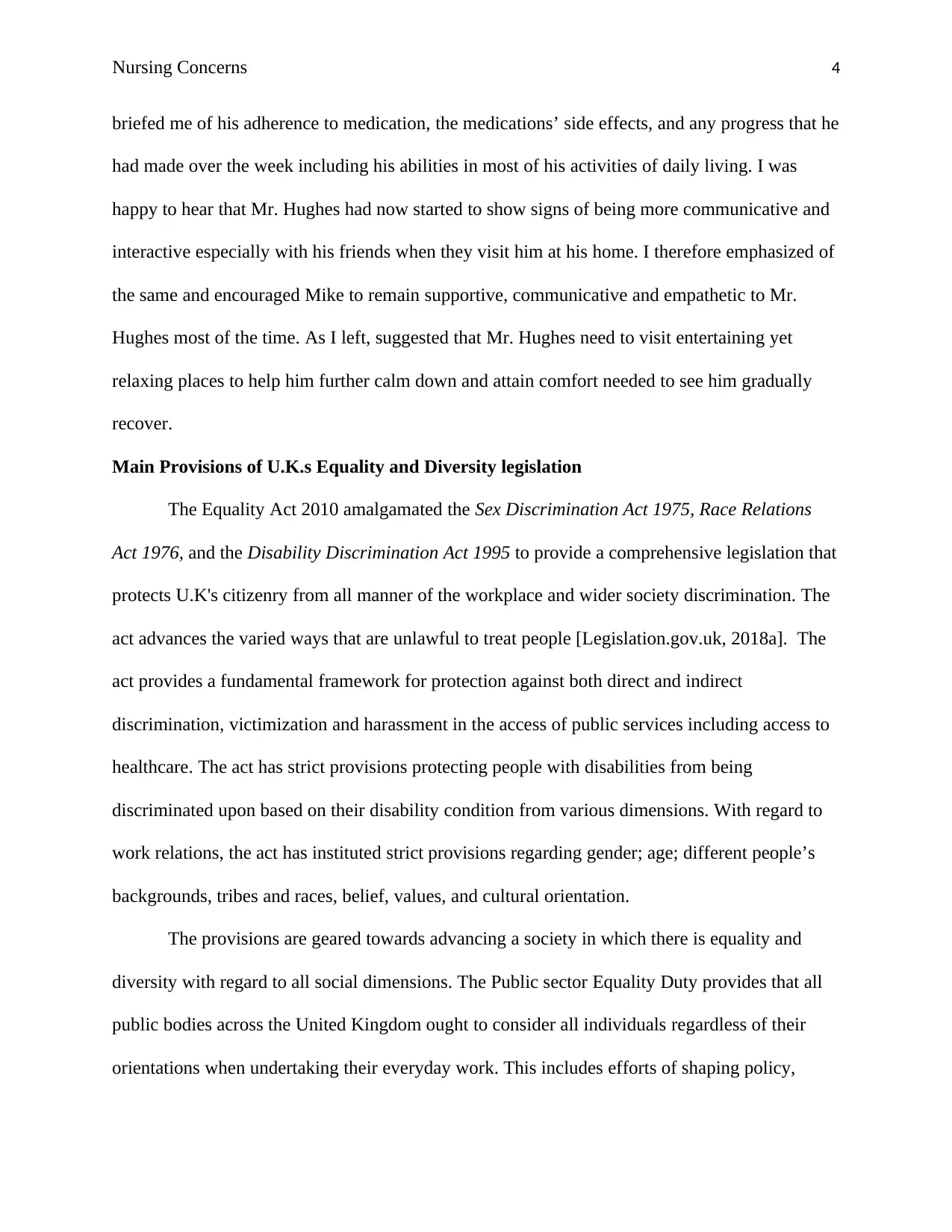
Nursing Concerns 4
briefed me of his adherence to medication, the medications’ side effects, and any progress that he
had made over the week including his abilities in most of his activities of daily living. I was
happy to hear that Mr. Hughes had now started to show signs of being more communicative and
interactive especially with his friends when they visit him at his home. I therefore emphasized of
the same and encouraged Mike to remain supportive, communicative and empathetic to Mr.
Hughes most of the time. As I left, suggested that Mr. Hughes need to visit entertaining yet
relaxing places to help him further calm down and attain comfort needed to see him gradually
recover.
Main Provisions of U.K.s Equality and Diversity legislation
The Equality Act 2010 amalgamated the Sex Discrimination Act 1975, Race Relations
Act 1976, and the Disability Discrimination Act 1995 to provide a comprehensive legislation that
protects U.K's citizenry from all manner of the workplace and wider society discrimination. The
act advances the varied ways that are unlawful to treat people [Legislation.gov.uk, 2018a]. The
act provides a fundamental framework for protection against both direct and indirect
discrimination, victimization and harassment in the access of public services including access to
healthcare. The act has strict provisions protecting people with disabilities from being
discriminated upon based on their disability condition from various dimensions. With regard to
work relations, the act has instituted strict provisions regarding gender; age; different people’s
backgrounds, tribes and races, belief, values, and cultural orientation.
The provisions are geared towards advancing a society in which there is equality and
diversity with regard to all social dimensions. The Public sector Equality Duty provides that all
public bodies across the United Kingdom ought to consider all individuals regardless of their
orientations when undertaking their everyday work. This includes efforts of shaping policy,
briefed me of his adherence to medication, the medications’ side effects, and any progress that he
had made over the week including his abilities in most of his activities of daily living. I was
happy to hear that Mr. Hughes had now started to show signs of being more communicative and
interactive especially with his friends when they visit him at his home. I therefore emphasized of
the same and encouraged Mike to remain supportive, communicative and empathetic to Mr.
Hughes most of the time. As I left, suggested that Mr. Hughes need to visit entertaining yet
relaxing places to help him further calm down and attain comfort needed to see him gradually
recover.
Main Provisions of U.K.s Equality and Diversity legislation
The Equality Act 2010 amalgamated the Sex Discrimination Act 1975, Race Relations
Act 1976, and the Disability Discrimination Act 1995 to provide a comprehensive legislation that
protects U.K's citizenry from all manner of the workplace and wider society discrimination. The
act advances the varied ways that are unlawful to treat people [Legislation.gov.uk, 2018a]. The
act provides a fundamental framework for protection against both direct and indirect
discrimination, victimization and harassment in the access of public services including access to
healthcare. The act has strict provisions protecting people with disabilities from being
discriminated upon based on their disability condition from various dimensions. With regard to
work relations, the act has instituted strict provisions regarding gender; age; different people’s
backgrounds, tribes and races, belief, values, and cultural orientation.
The provisions are geared towards advancing a society in which there is equality and
diversity with regard to all social dimensions. The Public sector Equality Duty provides that all
public bodies across the United Kingdom ought to consider all individuals regardless of their
orientations when undertaking their everyday work. This includes efforts of shaping policy,
Paraphrase This Document
Need a fresh take? Get an instant paraphrase of this document with our AI Paraphraser
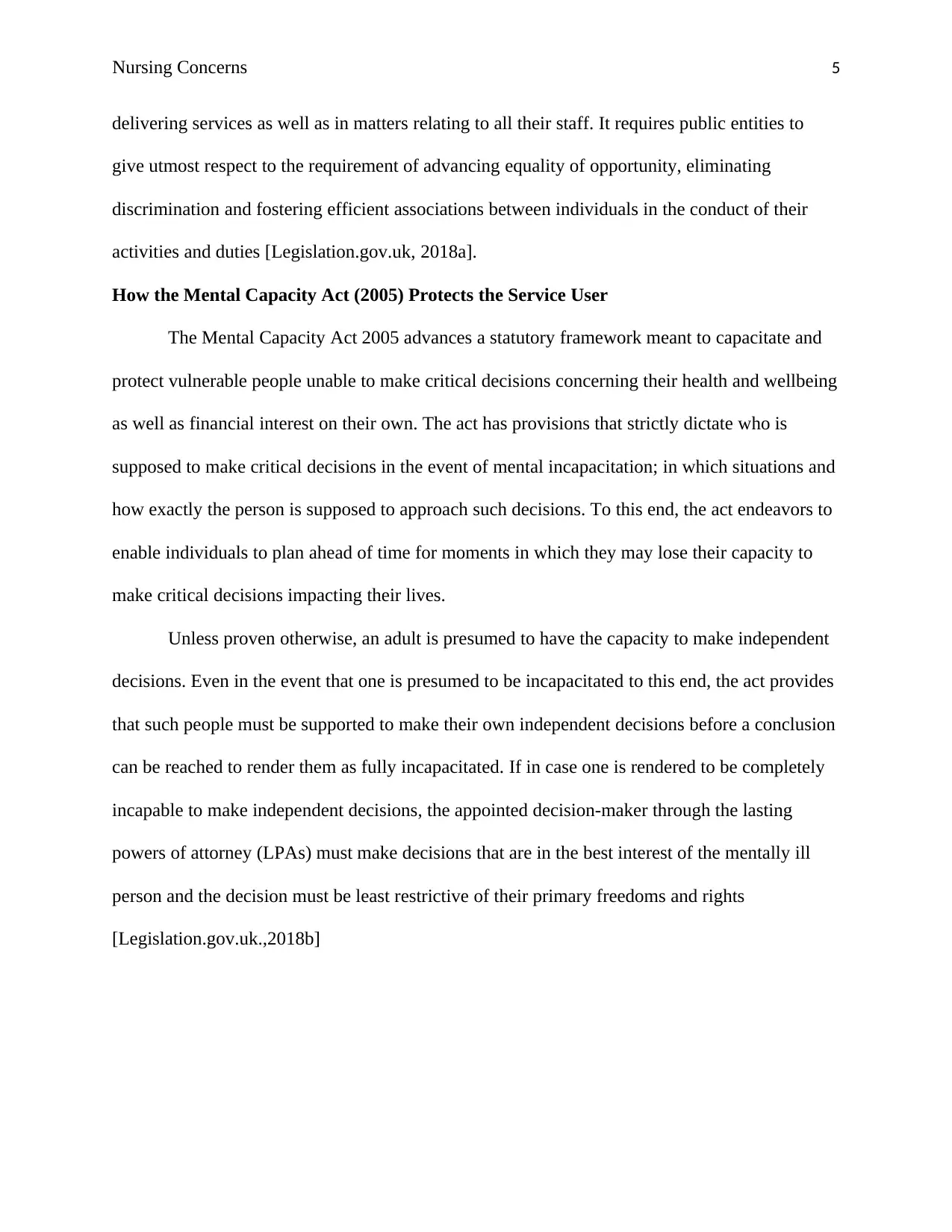
Nursing Concerns 5
delivering services as well as in matters relating to all their staff. It requires public entities to
give utmost respect to the requirement of advancing equality of opportunity, eliminating
discrimination and fostering efficient associations between individuals in the conduct of their
activities and duties [Legislation.gov.uk, 2018a].
How the Mental Capacity Act (2005) Protects the Service User
The Mental Capacity Act 2005 advances a statutory framework meant to capacitate and
protect vulnerable people unable to make critical decisions concerning their health and wellbeing
as well as financial interest on their own. The act has provisions that strictly dictate who is
supposed to make critical decisions in the event of mental incapacitation; in which situations and
how exactly the person is supposed to approach such decisions. To this end, the act endeavors to
enable individuals to plan ahead of time for moments in which they may lose their capacity to
make critical decisions impacting their lives.
Unless proven otherwise, an adult is presumed to have the capacity to make independent
decisions. Even in the event that one is presumed to be incapacitated to this end, the act provides
that such people must be supported to make their own independent decisions before a conclusion
can be reached to render them as fully incapacitated. If in case one is rendered to be completely
incapable to make independent decisions, the appointed decision-maker through the lasting
powers of attorney (LPAs) must make decisions that are in the best interest of the mentally ill
person and the decision must be least restrictive of their primary freedoms and rights
[Legislation.gov.uk.,2018b]
delivering services as well as in matters relating to all their staff. It requires public entities to
give utmost respect to the requirement of advancing equality of opportunity, eliminating
discrimination and fostering efficient associations between individuals in the conduct of their
activities and duties [Legislation.gov.uk, 2018a].
How the Mental Capacity Act (2005) Protects the Service User
The Mental Capacity Act 2005 advances a statutory framework meant to capacitate and
protect vulnerable people unable to make critical decisions concerning their health and wellbeing
as well as financial interest on their own. The act has provisions that strictly dictate who is
supposed to make critical decisions in the event of mental incapacitation; in which situations and
how exactly the person is supposed to approach such decisions. To this end, the act endeavors to
enable individuals to plan ahead of time for moments in which they may lose their capacity to
make critical decisions impacting their lives.
Unless proven otherwise, an adult is presumed to have the capacity to make independent
decisions. Even in the event that one is presumed to be incapacitated to this end, the act provides
that such people must be supported to make their own independent decisions before a conclusion
can be reached to render them as fully incapacitated. If in case one is rendered to be completely
incapable to make independent decisions, the appointed decision-maker through the lasting
powers of attorney (LPAs) must make decisions that are in the best interest of the mentally ill
person and the decision must be least restrictive of their primary freedoms and rights
[Legislation.gov.uk.,2018b]
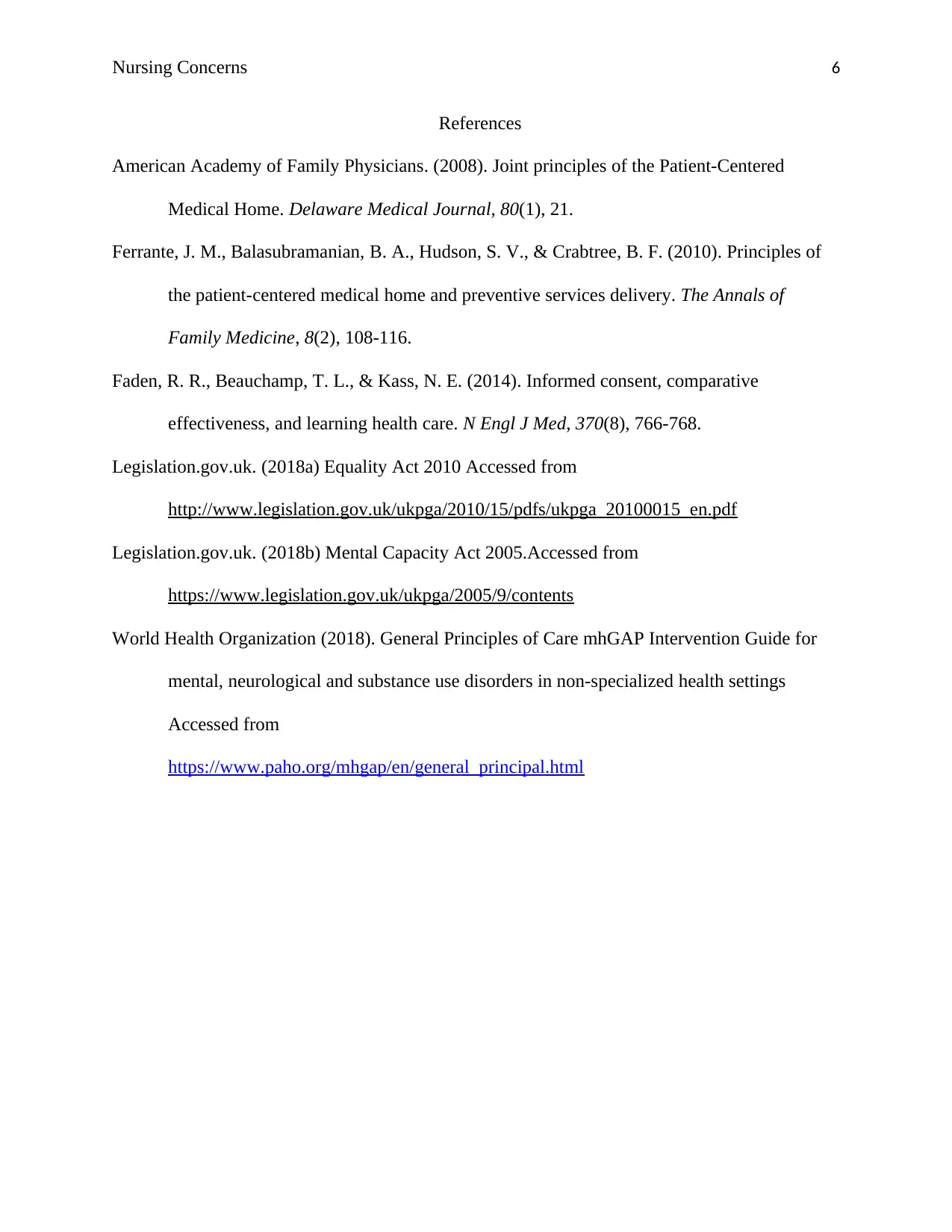
Nursing Concerns 6
References
American Academy of Family Physicians. (2008). Joint principles of the Patient-Centered
Medical Home. Delaware Medical Journal, 80(1), 21.
Ferrante, J. M., Balasubramanian, B. A., Hudson, S. V., & Crabtree, B. F. (2010). Principles of
the patient-centered medical home and preventive services delivery. The Annals of
Family Medicine, 8(2), 108-116.
Faden, R. R., Beauchamp, T. L., & Kass, N. E. (2014). Informed consent, comparative
effectiveness, and learning health care. N Engl J Med, 370(8), 766-768.
Legislation.gov.uk. (2018a) Equality Act 2010 Accessed from
http://www.legislation.gov.uk/ukpga/2010/15/pdfs/ukpga_20100015_en.pdf
Legislation.gov.uk. (2018b) Mental Capacity Act 2005.Accessed from
https://www.legislation.gov.uk/ukpga/2005/9/contents
World Health Organization (2018). General Principles of Care mhGAP Intervention Guide for
mental, neurological and substance use disorders in non-specialized health settings
Accessed from
https://www.paho.org/mhgap/en/general_principal.html
References
American Academy of Family Physicians. (2008). Joint principles of the Patient-Centered
Medical Home. Delaware Medical Journal, 80(1), 21.
Ferrante, J. M., Balasubramanian, B. A., Hudson, S. V., & Crabtree, B. F. (2010). Principles of
the patient-centered medical home and preventive services delivery. The Annals of
Family Medicine, 8(2), 108-116.
Faden, R. R., Beauchamp, T. L., & Kass, N. E. (2014). Informed consent, comparative
effectiveness, and learning health care. N Engl J Med, 370(8), 766-768.
Legislation.gov.uk. (2018a) Equality Act 2010 Accessed from
http://www.legislation.gov.uk/ukpga/2010/15/pdfs/ukpga_20100015_en.pdf
Legislation.gov.uk. (2018b) Mental Capacity Act 2005.Accessed from
https://www.legislation.gov.uk/ukpga/2005/9/contents
World Health Organization (2018). General Principles of Care mhGAP Intervention Guide for
mental, neurological and substance use disorders in non-specialized health settings
Accessed from
https://www.paho.org/mhgap/en/general_principal.html
⊘ This is a preview!⊘
Do you want full access?
Subscribe today to unlock all pages.

Trusted by 1+ million students worldwide
1 out of 6
Related Documents
Your All-in-One AI-Powered Toolkit for Academic Success.
+13062052269
info@desklib.com
Available 24*7 on WhatsApp / Email
![[object Object]](/_next/static/media/star-bottom.7253800d.svg)
Unlock your academic potential
Copyright © 2020–2026 A2Z Services. All Rights Reserved. Developed and managed by ZUCOL.




